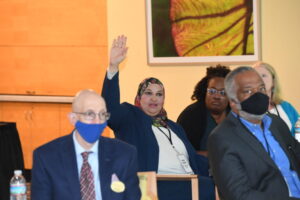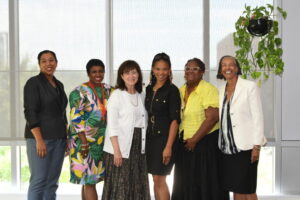UMBC is committed to helping to support faculty who are interested in pursuing leadership opportunities. The Breaking the M.O.L.D. program is an example of one of these opportunities. This program is a unique professional development initiative designed to create a pipeline to senior leadership in higher education for faculty members of color and women from the arts and humanities, as well as others with a proven record of promoting diversity within the academy. Supported by a generous 3.1 million-dollar grant from the Andrew W Mellon Foundation this initiative is led by six women in senior leadership serving as principal investigators (PI), five of whom are Black. Breaking the M.O.L.D. is a partnership between three institutions within the University System of Maryland: UMBC, University of Maryland at College Park, and Morgan State University. Below are pictures from the opening event in August 2022. (Photo credit: Jim Burger)


,


Professional Development
UMBC is an Institutional Member of the National Center for Faculty Development and Diversity (NCFDD). The NCFDD is an independent faculty development center dedicated to supporting academics in making successful transitions throughout their careers. We strongly encourage you to activate your membership as soon as you have a UMBC email account.
The Center for the Advancement of Learning and Teaching (CALT) through the work of the Faculty Development Center (FDC) supports faculty in their teaching role at UMBC by providing a comprehensive program of services and resources. The Center hosts numerous discussions each year on research-based best pedagogical practices and offers opportunities to obtain another perspective on your course(s) through their CATALyst midterm-feedback process, non-evaluative observations, and consultations. Certificate programs and Faculty Learning Communities offer more structured, sustained opportunities to explore and reflect on teaching in community with colleagues. The Center also provides support for learning assessment, pedagogical innovation and research (including the Hrabowski Fund for Innovation), a lending library, and robust web resources on teaching and learning. To learn more, visit their website and follow their myUMBC group.
